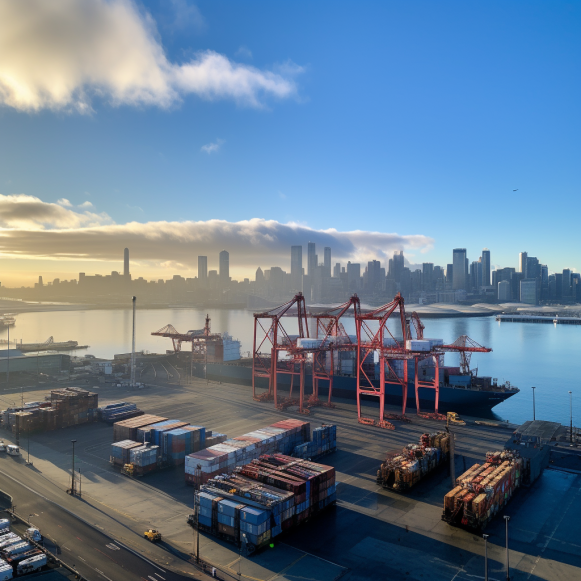Despite environmental concerns, Port of Oakland to allow sand and gravel plant

Lawsuit over health concerns, joined by state attorney general, expected to be settled
OAKLAND, Calif. — Officials at the city’s port will allow the construction of a sand and gravel plant that environmentalists and even the state attorney general have warned will worsen air pollution in West Oakland in exchange for millions of dollars in lease revenue.
Eagle Rock Aggregates, based in Vancouver, Canada, will store large quantities of building materials in the open air at the harbor’s 18-acre marine bulk terminal.
The 12-year lease, approved by the port’s board of commissioners last week, is expected to generate between $1 million and $6 million per year for the city’s port, where officials have pushed to increase economic activity and have frequently emphasized local job creation.
Residents and environmental advocates in nearby West Oakland neighborhoods have long claimed that the area has disproportionately higher levels of air pollution, and studies have shown that the area has twice the rate of asthma hospitalizations and emergency room visits as the rest of Alameda County.
Nonetheless, a lawsuit filed last year by the environmentalist group West Oakland Environmental Indicators Project and supported by the state attorney general is expected to result in a settlement that will allow the plant to be built.
Despite Eagle Rock’s assurances that the materials will be transported with fewer emissions than previously planned, the plant itself appears likely to operate without any covers that prevent air pollution.
The lease agreement was not commented on by port officials. According to a port spokesperson, the settlement’s details will not be made public until it is “fully executed and effective.”
The nearby port, freeways, rail activity, and other industries that generate diesel particulates, carbon emissions, and other toxic hazards contribute significantly to pollution in West Oakland.
“We have pushed the powers that be, the institutions at the port, to start being held accountable for what’s coming off their sites,” Margaret Gordon of the West Oakland Environmental Indicators Project said recently.
Last year, state Attorney General Rob Bonta joined the environmental group’s legal fight against the plant’s construction, acknowledging that the millions of tons of construction materials stored there could cause dust and particulate matter to float into the community.
“The Eagle Rock Aggregate Terminal will only add to their pollution burden, resulting in shorter life spans, more trips to the emergency room, and chronic illness,” said Bonta’s office at the time.
Other regional agencies, such as the Bay Area Air Quality Management District and the San Francisco Bay Conservation and Development Commission, have publicly urged the port to do more to mitigate the effects of the plant.
According to port officials, as part of the agreement, vessels traveling to Oakland will use shore power — an alternative to fuel — while berthed in the harbor.
Feeling that their concerns had been addressed, port staff touted the potential “revenue generation and portfolio diversification” that Eagle Rock’s plant would generate in a staff report.
“Further, the Project provides much-needed construction materials, all of which will be used for many local (and regional) construction projects that support housing, the local economy, and local jobs,” according to the report.
In the coming weeks, the port’s board is expected to bring the lease agreement back for a second reading and final vote.






